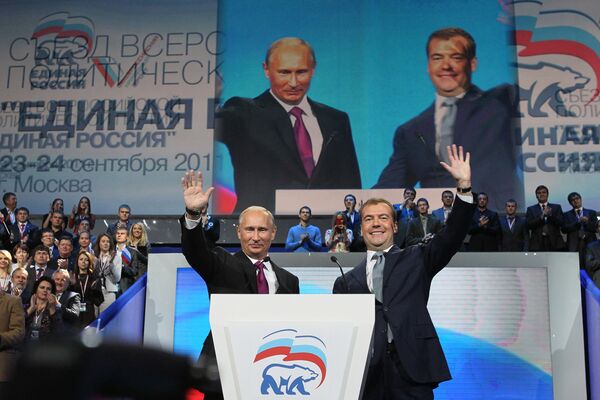MOSCOW, August 16 (RIA Novosti) – Russian regions, most of which heavily rely on federal subsidies to survive, are funded in part based on how strongly they support the ruling United Russia party at elections, a new study claimed.
The rule only applies to poorer regions with slow economic growth, according to the study by experts from the prestigious Higher School of Economics in Moscow, cited by Finmarket.ru on Thursday.
Seventy-three of 83 Russian regions were slated to receive federal subsidies in 2013, vying for a piece of the 1.4 trillion rubles ($42 billion) the central government allots to regional budgets every year, according to the Finance Ministry.
Though the government has repeatedly denied political motives behind the distribution of subsidies, a 1-percent increase in United Russia’s lead over rivals at polls in a given province statistically resulted in a “significant” increase in federal money for the region, the report said.
The rule only applied to regions with a GRP growth rate of under 4 percent, said the study, which was based on official data for budget transfers to 78 Russian regions in 2001-2008.
“Since United Russia’s creation in 2001, the authorities have actively used [money] transfers [to regions] for political gains,” the study said.
Opposition leaders have long accused authorities in the regions of using administrative resources and outright rigging to boost United Russia’s performance at the ballots.
Whistle-blowing blogger Alexei Navalny last year linked the speed of utilities tariffs’ hikes in the regions to the level of support they had shown for United Russia at parliamentary polls in 2011, launching a grassroots campaign to promote the idea through fake United Russia leaflets. A Navalny supporter was charged with extremism in the Volgograd Region last year for distributing the leaflets, though never convicted.
The Kremlin made no official comment on the Higher School of Economics’ study, but Vedomosti on Friday cited unnamed officials at the presidential administration as saying that regional authorities had not been instructed to support United Russia at the upcoming round of regional polls on September 8.


